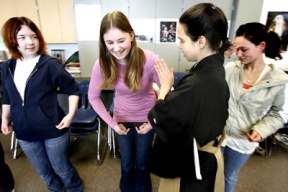Japanese language students at BHS learn the ways of Noh.
The 18 students in Kris Henshaw’s Japanese language class crouch and howl in unison.
“Very nice,” says visiting artist Jubilith Moore, “and very tame.”
Moore encourages a more robust response from the circle, students gathered to experience first-hand the rigors of traditional Japanese Kyogen theater techniques.
The class is the first event in a week-long experience of the dramatic form that encompasses workshops led by Moore and performance by San Francisco’s Theatre Yugen, a company presenting traditional and interpretive works of Noh and Kyogen.
Moore came to San Francisco in 1987 after studying drama and dance at Bard College in New York. She happened onto Theatre Yugen, she says, by crashing an audition call for Asian Americans.
While Moore wasn’t cast, she was noticed by Yuriko Doi, who had left her native Japan and founded Theatre of Yugen in San Francisco in 1975. Doi offered Moore a chance to audition for Drifting Fires, a contemporary Noh play written in English.
But it was to Kyogen that Moore found herself most attracted. In contrast to the formalities and high seriousness of Noh, Kyogen – a form that dates 600 years to the samurai era – relies on humor, animated characterizations and recognizably human folly.
“We call it ‘the little brother of Noh,’” Moore said. “It’s a very vital, comedic, earthy, human-based theater form.”
After the Drifting Fires project, Doi invited Moore to train with her. She followed the traditional Kyogen sequence, learning the Master, then the Second Servant.
Last, Moore studied Taro-kaja, the part of the clever First Servant who outwits the Master. She also traveled to Japan to study with Noh and Kyogen luminaries.
In 2001, Doi passed artistic directorship to Moore and fellow company member Lluis Valls. They collaborated to create experimental works based on Mary Shelley’s “Frankenstein” and Ernest Hemingway’s “The Old Man and the Sea.”
Doi’s approach to Kyogen adaptations concedes something to a Western sensibility more attuned to action and plot than the traditional Japanese approach. But Doi has found the right balance between tradition and accessibility, Moore believes.
And, she adds, no matter who the presenters are, the form will evolve over time.
“It’s passed down from generation to generation,” Moore said, “but each generation puts their stamp on it to keep it vital.”
Children begin their study at 3, often with a grandparent. The child will start with the easiest role, the monkey. Then they learn the role of the Master, because the part calls for a posture that is relatively easy to maintain.
Later, the student will learn roles that range from a mushroom to a priest. Each calls for a distinctive way of moving. Even without the costumes derived from the ordinary garb of medieval Japan, Kyogen cognoscenti are able distinguish Woman from Servant and Master from Priest by subtle nuances in the pitch of a head, the angle of a wrist, the stance of a foot.
For students of all ages, learning begins with the lines, and the “kata,” or movement patterns. Next, a teacher will be concerned with the student’s “heart,” or expression.
Only then is attention paid to the grace of an individual’s movement or the quality of a particular voice.
Moore points to the contrast with Western theater’s emphasis on the individuality of the actor.
Kyogen students must learn all the lines of all 260 independent plays, and be an experienced performer of all the parts, culminating in the Taro-kaja, often called the heart of the Kyogen.
Not until students are in their 30s or 40s are they considered to have acquired mastery.
But there is no end point in Kyogen study.
“Break it down,” Moore said. “Go back to the beginning. Take your time. The form is so big and so expansive that you can study it for your whole life. It’s very Zen: You just always go back to the beginning.
“When you think you’re done, go back to the beginning.”
******************
In the Noh
Bainbridge Island Arts Education Community Consortium, a Bainbridge Island Arts and Humanities Council program, and Bainbridge Performing Arts present San Francisco’s acclaimed Theatre of Yugen, featuring the classic Japanese comic theater form, Kyogen, at BPA Feb. 26 through March 2. Kyogen are short plays often featuring the misadventures of a humorous “Everyman.” For the Bainbridge performances, Theatre Yugen is joined by company founder, Yuriko Doi.
Performances for Bainbridge Island Arts Education Community Consortium’s Student Outreach Program are 11 a.m. and 1:30 p.m. March 1, and 11 a.m. and 1 p.m. March 2 at Bainbridge Peforming Arts. Tickets are $5. Performances for BPA’s International Series are 7:30 p.m. and 9:15 p.m. at The Playhouse. Tickets are $15 for adults, $10 for students. Call 842-8569.


